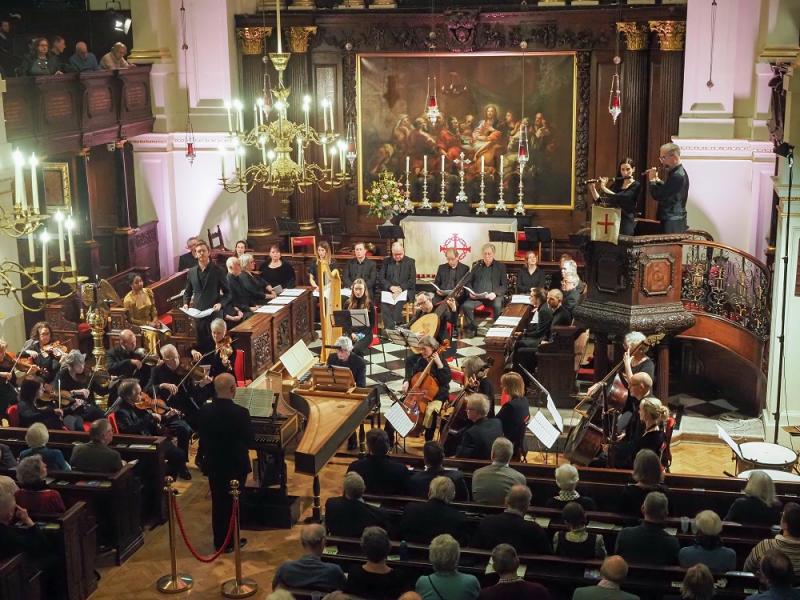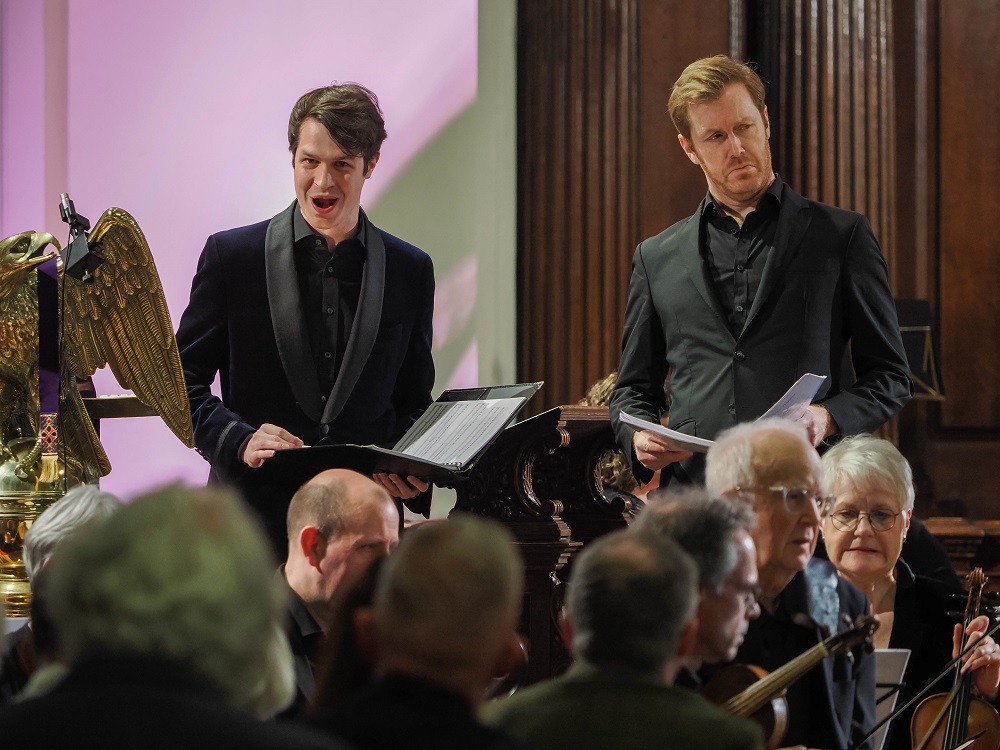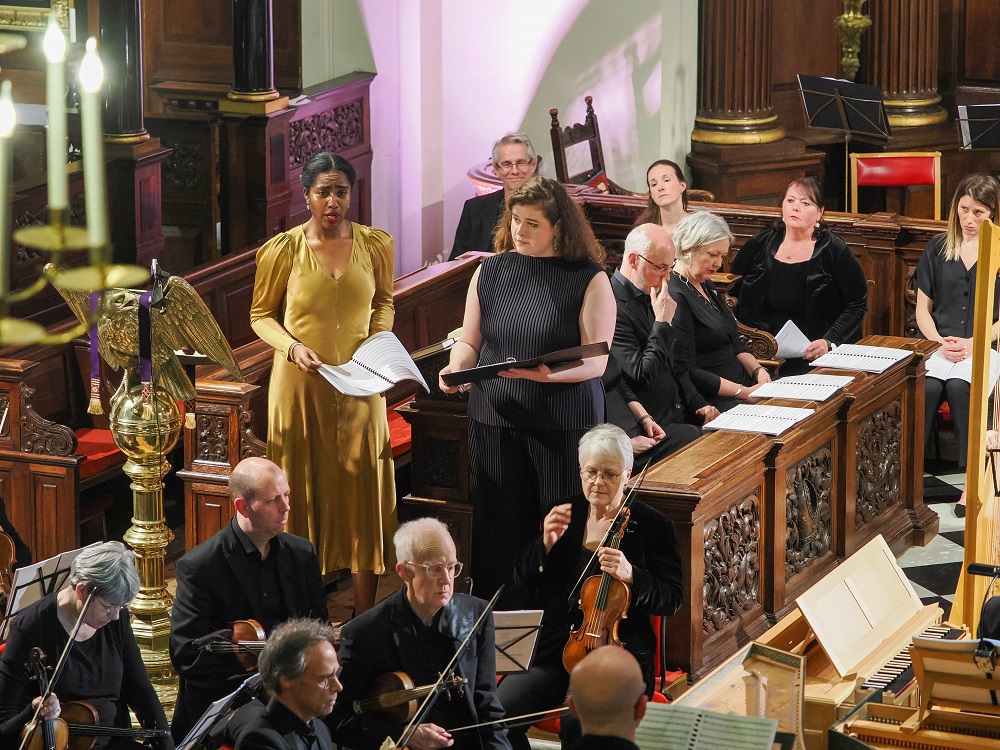Esther, London Handel Festival, St George’s Hanover Square review - a lopsided celebratory oratorio | reviews, news & interviews
Esther, London Handel Festival, St George’s Hanover Square review - a lopsided celebratory oratorio
Esther, London Handel Festival, St George’s Hanover Square review - a lopsided celebratory oratorio
Anniversary acclaim rooted in the honorary Londoner's first concert drama

“Spring Awakenings” promised as the theme of this year’s London Handel Festival began with a big if messy vernal bouquet of “Alleluia"s and “God Save the King”s. Esther, Handel's first London oratorio, seemed like an appropriately jubilant way to celebrate Laurence Cummings' 25th and final year as festival director.
That meant cramming more than 60 musicians in to the east end of the not exactly commodious St George’s Hanover Square, and some curious balances for many of us in the packed church. I got an earful of the four oboes, with attendant squeaks from time to time, and their pulsing initially concealed the familiar string arpeggios of the glorious anthem we know as “Zadok the Priest”. For the first public performance of Esther in 1732, some 12 years after its modest inception and seemingly a rushed job to prevent plagarsed performances, Handel engrafted parts of it – starting as “Blessed are all they that fear the Lord”, since the king is Persian Ahasuerus and not Solomon – along with fellow coronation celebration “My heart is inditing”.  The whole thing is something of a pasticcio, with no less than nine numbers taken from the wondrous Brockes-Passion – featuring later this festival – including the reworking of Christ’s plaint from the cross as villain Haman's unsuccessful plea for mercy to Esther, “Turn not, o Queen, thy face away”. All his music, the only part of the score amounting to a real characterisation, was sung with total vividness by the winner of last year’s International Handel Singing Competition within the festival, Florian Störtz – a young bass-baritone destined for a major career (pictured above with Tim Mead),
The whole thing is something of a pasticcio, with no less than nine numbers taken from the wondrous Brockes-Passion – featuring later this festival – including the reworking of Christ’s plaint from the cross as villain Haman's unsuccessful plea for mercy to Esther, “Turn not, o Queen, thy face away”. All his music, the only part of the score amounting to a real characterisation, was sung with total vividness by the winner of last year’s International Handel Singing Competition within the festival, Florian Störtz – a young bass-baritone destined for a major career (pictured above with Tim Mead),
The soloists made up something of a dream team, albeit one of various vocal approaches, though Nardus Williams as the eponymous Jewish maiden selected as bride for Ahasuerus got fewer chances to shine as she always does with her intense musicality and poise than Rachel Redmond as the Israelite Woman. Jess Dandy’s utterly distinctive contralto (Dandy pictured below on the right with Williams) joined Störtz as temporary mourner – the work makes a mess of what little dastardliness there is in an inexplicable plot – and Tim Mead surmounted the most difficult challenge right at the end, with the endless runs in his “Alleluia”s between mass jubilation. A neat cameo came from Cummings, clarion tenor as an Israelite in a couple of recits.  Choral voices flourished in the numerous acclamations, and though the drama in Handel’s first oratorio may be negligible – it’s surprising that Pope was keen to claim the muddled text, made worse in 1732 – another bonus of the expansion is the range of instruments we get to hear, including horns to gild pomp and an elaborate role for Lise Vandersmissen‘s harp, placed centre stage (vocal soloists had to make do with the sides and, occasionally, the pulpit). Everyone welcomes a Handel work with more than one duet and the usual strings with woodwind, and in that Cummings and Co were on to a winner. Alleluia, amen.
Choral voices flourished in the numerous acclamations, and though the drama in Handel’s first oratorio may be negligible – it’s surprising that Pope was keen to claim the muddled text, made worse in 1732 – another bonus of the expansion is the range of instruments we get to hear, including horns to gild pomp and an elaborate role for Lise Vandersmissen‘s harp, placed centre stage (vocal soloists had to make do with the sides and, occasionally, the pulpit). Everyone welcomes a Handel work with more than one duet and the usual strings with woodwind, and in that Cummings and Co were on to a winner. Alleluia, amen.
rating
Explore topics
Share this article
The future of Arts Journalism
You can stop theartsdesk.com closing!
We urgently need financing to survive. Our fundraising drive has thus far raised £49,000 but we need to reach £100,000 or we will be forced to close. Please contribute here: https://gofund.me/c3f6033d
And if you can forward this information to anyone who might assist, we’d be grateful.

Subscribe to theartsdesk.com
Thank you for continuing to read our work on theartsdesk.com. For unlimited access to every article in its entirety, including our archive of more than 15,000 pieces, we're asking for £5 per month or £40 per year. We feel it's a very good deal, and hope you do too.
To take a subscription now simply click here.
And if you're looking for that extra gift for a friend or family member, why not treat them to a theartsdesk.com gift subscription?
more Classical music
 Scottish Chamber Orchestra, Ibragimova, Queen’s Hall, Edinburgh review - rarities, novelties and drumrolls
A pity the SCO didn't pick a better showcase for a shining guest artist
Scottish Chamber Orchestra, Ibragimova, Queen’s Hall, Edinburgh review - rarities, novelties and drumrolls
A pity the SCO didn't pick a better showcase for a shining guest artist
 Kilsby, Parkes, Sinfonia of London, Wilson, Barbican review - string things zing and sing in expert hands
British masterpieces for strings plus other-worldly tenor and horn - and a muscular rarity
Kilsby, Parkes, Sinfonia of London, Wilson, Barbican review - string things zing and sing in expert hands
British masterpieces for strings plus other-worldly tenor and horn - and a muscular rarity
 From Historical to Hip-Hop, Classically Black Music Festival, Kings Place review - a cluster of impressive stars for the future
From quasi-Mozartian elegance to the gritty humour of a kitchen inspection
From Historical to Hip-Hop, Classically Black Music Festival, Kings Place review - a cluster of impressive stars for the future
From quasi-Mozartian elegance to the gritty humour of a kitchen inspection
 Shibe, LSO, Adès, Barbican review - gaudy and glorious new music alongside serene Sibelius
Adès’s passion makes persuasive case for the music he loves, both new and old
Shibe, LSO, Adès, Barbican review - gaudy and glorious new music alongside serene Sibelius
Adès’s passion makes persuasive case for the music he loves, both new and old
 Anja Mittermüller, Richard Fu, Wigmore Hall review - a glorious hall debut
The Austrian mezzo shines - at the age of 22
Anja Mittermüller, Richard Fu, Wigmore Hall review - a glorious hall debut
The Austrian mezzo shines - at the age of 22
 First Person: clarinettist Oliver Pashley on the new horizons of The Hermes Experiment's latest album
Compositions by members of this unusual quartet feature for the first time
First Person: clarinettist Oliver Pashley on the new horizons of The Hermes Experiment's latest album
Compositions by members of this unusual quartet feature for the first time
 Gesualdo Passione, Les Arts Florissants, Amala Dior Company, Barbican review - inspired collaboration excavates the music's humanity
At times it was like watching an anarchic religious procession
Gesualdo Passione, Les Arts Florissants, Amala Dior Company, Barbican review - inspired collaboration excavates the music's humanity
At times it was like watching an anarchic religious procession
 Classical CDs: Camels, concrete and cabaret
An influential American composer's 90th birthday box, plus British piano concertos and a father-and-son duo
Classical CDs: Camels, concrete and cabaret
An influential American composer's 90th birthday box, plus British piano concertos and a father-and-son duo
 Cockerham, Manchester Camerata, Sheen, Martin Harris Centre, Manchester review - re-enacting the dawn of modernism
Two UK premieres added to three miniatures from a seminal event of January 1914
Cockerham, Manchester Camerata, Sheen, Martin Harris Centre, Manchester review - re-enacting the dawn of modernism
Two UK premieres added to three miniatures from a seminal event of January 1914
 Kempf, Brno Philharmonic, Davies, Bridgewater Hall, Manchester review - European tradition meets American jazz
Bouncing Czechs enjoy their Gershwin and Brubeck alongside Janáček and Dvořák
Kempf, Brno Philharmonic, Davies, Bridgewater Hall, Manchester review - European tradition meets American jazz
Bouncing Czechs enjoy their Gershwin and Brubeck alongside Janáček and Dvořák
 Solomon, OAE, Butt, QEH review - daft Biblical whitewashing with great choruses
Even a top soprano and mezzo can’t make this Handel paean wholly convincing
Solomon, OAE, Butt, QEH review - daft Biblical whitewashing with great choruses
Even a top soprano and mezzo can’t make this Handel paean wholly convincing
 Two-Piano Gala, Kings Place review - shining constellations
London Piano Festival curators and illustrious friends entertain and enlighten
Two-Piano Gala, Kings Place review - shining constellations
London Piano Festival curators and illustrious friends entertain and enlighten

Add comment